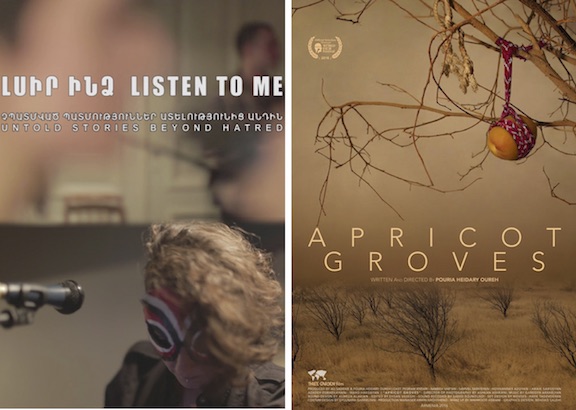BY LOUSINE SHAMAMIAN
This past weekend’s Arpa International Film Festival was a momentous occasion for the arts and Armenia. It is probably not news to many how difficult it can be to be openly LGBT within our Armenian community. Film is an opportunity to give voice to the voiceless, bringing to the center those who are marginalized and allowing those voices to be heard. The 2017 Golden Apricot Yerevan International Film Festival in Armenia was originally slated to include two Armenian films with LGBT themes, “Listen To Me” and “Apricot Groves,” but they were dropped due to pressure from the Cinematographers Union. This past weekend, we in LA were lucky enough to be able to screen these two films at the Arpa International Film Festival.
When the Golden Apricot Festival censored these films, it squandered the opportunity to participate in one of the most meaningful traditions of filmmaking: being a catalyzing force for social and cultural change. Aside from this lost opportunity, the censorship at Golden Apricot has a larger impact on our Armenian community as a whole. What could have been a moment of growing tolerance and acceptance instead harkened back to a darker time.
As Armenians we know all too well what it means to be censored. Having lived in our native land of Anatolia for so many centuries, many of those as minorities ruled by unforgiving empires, we know the delicate intricacies of conforming in order not to raise the ire of the dominant power.
Our fear and compromise of our freedom, liberty, and identity reaches far back, well before the Genocide. When LGBT Armenians claim their existence, the resistance from the broader Armenian community stems from centuries of needing to assimilate and avoid being a target.
It shows up in every household that is more preoccupied with what their Armenian friends, family, and neighbors think or will say than with their own genuine thoughts, interests or motivations. We live in fear of not fitting the mold that has been deemed acceptable by our community’s patriarchs and matriarchs.
Film has the power to shift these perceptions, to normalize what for so many is taboo. This is why this weekend’s line up at Arpa International Film Festival is breathtakingly profound: two LGBT themed Armenian films in one Armenian film festival. Had Armenia’s Golden Apricot Film Festival stood bravely behind their original programming decisions, they unquestionably would have expedited the tide of progress.
In Avo Kambourian’s film “Echoes of Survival,” renowned oud player Ara Dinkjian says “the Armenians in Turkey are heroes to me, because I don’t know of any place where it is as difficult to remain Armenian. They have held that torch and I think they should be recognized and praised.” I agree with Ara and I can’t help but take it a step further. I would contend that the second most difficult place for Armenians to remain Armenian is Armenia – if you are LGBT. The same way the Armenian community as a minority in Turkey can’t act freely, must calculate their every move because essentially they are villainized, so must the LGBT Armenians in Armenia.
This struggle is at the heart of Gagik Ghazareh’s intimate documentary “Listen To Me” about LGBT Armenians in Armenia. One of the participants of “Listen To Me” eloquently asks “Are we asking for any special treatments? No, we want the same rights as everyone else: to be given the freedom and respect to live our lives as everyone else. At the end of the day, we are all human.” Which is why “Listen To Me” should be essential viewing for all Armenians both in and outside of Armenia. This beautiful documentary presents the spectrum of the LGBT experience in Armenia through candid interviews with brave souls who have risked making themselves targets in order to speak their truth. They share their humanity and as a result, make it easier for all those who live in fear, silence, and lies because frankly, sometimes their lives depend on it.
It is due time that hatred towards the LGBT community in Armenia and the diaspora ceases to exist. Of course, the culture is slowly shifting thanks to brave people like the ones who are featured in “Listen To Me” and are a part of the organization Pink Armenia, which fights for human rights in Armenia. GALAS, the Gay and Lesbian Armenian Society, is trying to do the same here in Los Angeles.
In this work, we need to understand that it is human nature to fear what is different. Without strong counter narratives, can you blame the Turks growing up in Turkey for the views they hold, who for decades were taught that Armenians are evil, conniving, and not to be trusted? Ultimately, our limitations as people lay in our inability to see one another’s humanity. Our shared humanity should prevail. Allowing another man or woman to live their life, to love who they love, to express their gender identity in the way that feels true to who they are, should not be up for communal debate. Just as respect and freedom for the existence of Armenians in Turkey or immigrants in America shouldn’t be up for debate, neither should LGBT identity be under attack in Armenia.
I commend Arpa for screening the two films that were censored at the Golden Apricot Festival. The Golden Apricot Festival should redeem itself by screening “Listen To Me” and “Apricot Groves” at next year’s festival and celebrate the essential duty of all Armenians to respect one another’s humanity. We as a people need more films like these, not fewer.
Learn more about the Arpa International Film Festival and GALAS.
Lousine Shamamian is a comedian, performer and originator of the web series “Lousine: Lesbian Matchmaker To The Straights.” A television editor and board member of GALAS – The Gay and Lesbian Armenian Society, she was born in Armenia, raised in Brooklyn and now resides in Los Angeles.























































